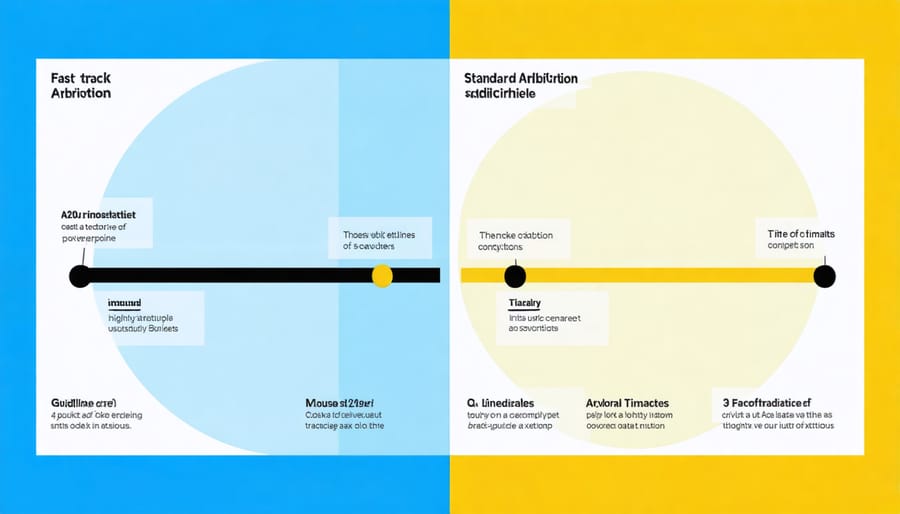In the high-stakes world of construction projects, effective arbitration rules serve as the cornerstone of dispute resolution, safeguarding billions in investments and maintaining project momentum. The American Arbitration Association’s Construction Industry Arbitration Rules, along with other recognized frameworks, provide essential structure for resolving complex construction disputes while preserving business relationships and minimizing costly project delays.
Recent industry data reveals that over 80% of major construction projects encounter significant disputes, with arbitration emerging as the preferred resolution mechanism for claims exceeding $500,000. This systematic approach to conflict resolution has proven particularly vital in today’s fast-paced construction environment, where traditional litigation often proves too costly and time-consuming.
Understanding and implementing these specialized arbitration rules has become critical for construction professionals, from general contractors to project owners. These protocols address industry-specific challenges such as concurrent delay claims, design defects, and payment disputes while offering expedited procedures for time-sensitive matters. Moreover, they provide a framework that balances technical expertise with legal principles, ensuring fair and informed resolution of complex construction disputes.
This comprehensive guide examines the essential elements of construction industry arbitration rules, their practical application, and strategic considerations for stakeholders navigating the dispute resolution process.
Key Components of Construction Arbitration Rules
Initiating Arbitration Proceedings
To initiate arbitration proceedings in the construction industry, the claimant must first file a written demand for arbitration with the designated arbitration administrator. This demand typically includes details of the dispute, monetary claims, and relevant documentation from large-scale construction contracts. The filing party must also provide copies of the demand to all responding parties.
Upon receiving the demand, respondents generally have 14 calendar days to file an answering statement and any counterclaims. The response should address each allegation in the demand and include supporting documentation. If a counterclaim is filed, the original claimant has an additional 14 days to respond.
The arbitration administrator then reviews the submissions for completeness and compliance with applicable rules. Once accepted, the case proceeds to arbitrator selection. During this phase, parties may jointly select an arbitrator from an approved panel or utilize the administrator’s list appointment procedure. Parties typically have 14 days to submit their arbitrator preferences.
After arbitrator appointment, an initial preliminary hearing is scheduled to establish the procedural framework, including discovery schedules, hearing dates, and any special requirements for the proceedings.
Arbitrator Selection and Qualification Requirements
Arbitrator selection in construction disputes requires careful consideration of both technical expertise and dispute resolution experience. The American Arbitration Association (AAA) and other major arbitration institutions maintain panels of qualified arbitrators who meet specific requirements for construction cases.
Qualified arbitrators must typically possess a minimum of 10 years of experience in construction-related fields, such as engineering, architecture, construction law, or project management. They should demonstrate substantial knowledge of construction contracts, industry practices, and relevant regulations. Many institutions require arbitrators to complete specialized training programs focusing on construction dispute resolution techniques and procedural rules.
For complex construction disputes, parties often opt for a three-member arbitration panel. In such cases, each party typically selects one arbitrator, and these two arbitrators then choose the third who serves as the panel chair. This arrangement ensures balanced expertise and perspective in decision-making.
Key qualification requirements include:
– Professional credentials in construction-related fields
– Demonstrated experience in dispute resolution
– Absence of conflicts of interest
– Completion of certified arbitrator training programs
– Understanding of construction law and contracts
– Strong analytical and decision-making abilities
Parties should thoroughly review potential arbitrators’ backgrounds, past decisions, and any potential conflicts before making their selection. Many institutions provide detailed arbitrator profiles and allow parties to rank their preferences from a provided list of qualified candidates.

Specialized Construction Industry Provisions
Fast-Track Procedures
Fast-track arbitration procedures offer streamlined resolution pathways for time-sensitive construction disputes, typically completing within 60-90 days. These expedited processes are particularly valuable for ongoing projects where delays in dispute resolution could impact project timelines and costs.
Under fast-track procedures, parties must meet strict scheduling requirements. The arbitrator is typically appointed within 7-14 days of filing, and preliminary hearings are conducted within 10 days of appointment. Document exchange and discovery periods are significantly condensed, usually limited to 14-21 days.
Key features of fast-track construction arbitration include:
– Single arbitrator appointment instead of a panel
– Shortened notice periods and response deadlines
– Limited discovery and document production
– Streamlined evidentiary procedures
– Abbreviated hearing schedules
– Expedited award delivery (typically within 14 days of hearing conclusion)
To qualify for fast-track procedures, disputes generally must meet specific criteria, such as:
– Claims below a certain monetary threshold (often $100,000-$500,000)
– Emergency situations affecting project completion
– Matters involving limited complexity
– Mutual agreement between parties
While fast-track procedures can significantly reduce time and costs, they require careful consideration. Parties must be prepared to proceed quickly and have readily available documentation and witnesses. Success often depends on thorough pre-dispute preparation and maintaining organized project records.

Emergency Measures
Emergency measures in construction arbitration provide expedited relief for time-sensitive situations that could significantly impact project completion or cause irreparable harm. These provisions typically allow parties to request immediate interim relief before the full arbitration tribunal is constituted.
Under most construction arbitration rules, parties can seek emergency relief through an appointed emergency arbitrator within 24-48 hours of filing the request. This arbitrator has authority to issue binding interim orders or awards addressing critical situations such as work stoppages, preservation of evidence, or protection of project assets.
To obtain emergency measures, the requesting party must demonstrate:
– Urgent need for immediate relief
– Risk of irreparable harm without intervention
– Reasonable likelihood of success on the merits
– Balance of hardships favoring the requested relief
Common scenarios warranting emergency measures include:
– Preventing unauthorized site access
– Halting destructive construction activities
– Preserving critical evidence
– Maintaining essential safety protocols
– Protecting intellectual property rights
Emergency decisions remain in effect until modified or terminated by the full arbitration tribunal. Parties must comply immediately with emergency orders, though they retain the right to challenge these decisions before the main tribunal. Non-compliance may result in adverse inferences or monetary penalties during the primary arbitration proceedings.
The emergency arbitrator’s jurisdiction ends once the full tribunal is constituted, typically within 15 days of the initial emergency request.

Regulatory Compliance and Standards
International vs. Domestic Standards
Construction arbitration rules vary significantly across international borders, with notable differences between established frameworks like the International Chamber of Commerce (ICC) Rules and domestic standards. While international arbitration often follows the UNCITRAL Model Law, domestic procedures typically align with national construction legislation and local industry practices.
Key international institutions such as the ICC, LCIA, and SIAC have developed specialized construction arbitration protocols that accommodate complex technical disputes and multi-party scenarios. These rules generally offer greater flexibility in arbitrator selection and procedural matters compared to domestic frameworks.
Domestic standards, particularly in developed construction markets, often feature industry-specific provisions that reflect local building codes and regulatory requirements. For instance, the American Arbitration Association’s Construction Industry Arbitration Rules emphasize technical expertise and expedited procedures, while the UK’s Construction Industry Model Arbitration Rules (CIMAR) focus on cost-effectiveness and swift resolution.
The choice between international and domestic standards typically depends on project scope, contractual relationships, and jurisdictional requirements. Cross-border projects increasingly adopt hybrid approaches, combining elements from both international and domestic frameworks to ensure effective dispute resolution.
Industry-Specific Requirements
Different construction sectors require specific arbitration provisions tailored to their unique challenges and operational frameworks. Commercial construction projects typically demand provisions addressing change orders, delay claims, and quality standards, while residential construction arbitration focuses heavily on warranty issues and homeowner rights. Infrastructure projects need specialized provisions for government contracts and compliance with construction regulations.
Heavy industrial construction requires arbitration rules that address complex technical specifications, equipment performance standards, and environmental compliance. These projects often involve multiple contractors and sophisticated engineering requirements, necessitating detailed dispute resolution mechanisms. Meanwhile, specialty construction sectors, such as healthcare facilities or data centers, require provisions that consider operational continuity and specialized certification requirements.
The arbitration process must also account for project delivery methods. Design-build projects need provisions addressing both design and construction responsibilities, while traditional design-bid-build projects require clear delineation of duties between architects, contractors, and owners. Fast-track construction projects demand expedited arbitration procedures to maintain project momentum while resolving disputes effectively.
Practical Implementation Strategies
To effectively implement construction industry arbitration rules, organizations should establish a systematic approach that begins well before disputes arise. First, ensure all contracts clearly specify the arbitration procedures, including the governing body (such as AAA or ICC) and applicable rules. This documentation should align with relevant construction safety standards and industry regulations.
Maintain detailed project documentation, including daily logs, change orders, and communication records, as these form the foundation of successful arbitration proceedings. Implement a tiered dispute resolution system, starting with informal negotiations, then mediation, before proceeding to formal arbitration.
Select arbitrators with specific construction industry expertise, particularly in areas relevant to potential disputes. Consider creating a pre-approved panel of arbitrators familiar with your organization’s projects and technical requirements.
Establish internal protocols for evidence preservation and document management. This includes implementing digital documentation systems and training staff on proper record-keeping procedures. Regular audits of these systems ensure compliance and readiness for potential disputes.
Consider cost-effectiveness by incorporating expedited procedures for smaller disputes and comprehensive procedures for complex cases. Set clear timelines and deadlines for each stage of the arbitration process, and ensure all parties understand their roles and responsibilities.
Remember that successful arbitration often depends on preparation and prevention. Regular staff training on contract administration, dispute avoidance, and early identification of potential conflicts can significantly reduce the need for formal arbitration proceedings.
Construction industry arbitration continues to evolve as a vital dispute resolution mechanism, offering significant advantages in terms of efficiency, cost-effectiveness, and industry-specific expertise. As the construction sector becomes increasingly complex and globalized, the importance of well-structured arbitration rules and procedures cannot be overstated.
The key takeaways from our analysis highlight the critical role of detailed contract clauses, proper documentation, and expert arbitrator selection in successful dispute resolution. Industry professionals must stay informed about emerging trends, including the integration of technology in arbitration proceedings and the growing emphasis on expedited procedures for time-sensitive disputes.
Looking ahead, construction arbitration is likely to see further refinements in response to industry needs. The rise of international projects and cross-border disputes will drive the development of more sophisticated arbitration frameworks. Additionally, the increasing focus on sustainability and digital transformation in construction will introduce new types of disputes requiring specialized arbitration expertise.
For construction industry stakeholders, maintaining current knowledge of arbitration rules and best practices remains essential for effective risk management and project success. As the industry continues to evolve, so too will the mechanisms for resolving its disputes.

